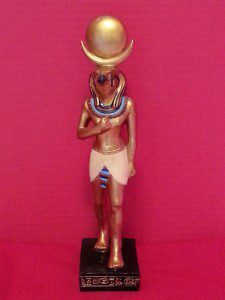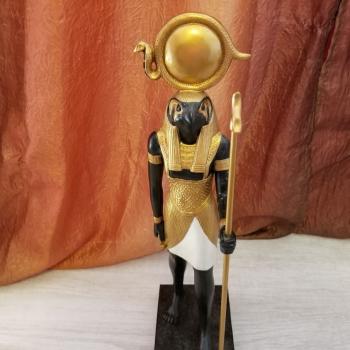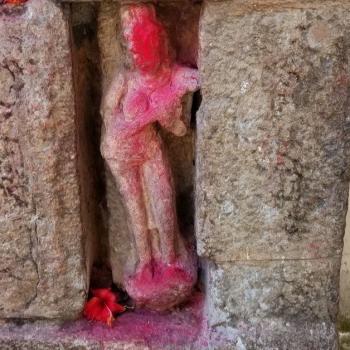Book of the Law, Chapter III, line 7: “I will give you a war engine.”
When I served as master of Vortex Oasis (a local body of Ordo Templi Orientis) I held outreach events centered on reading a chapter of the Book of the Law. Chapter I is a crowd pleaser, especially for goddess-oriented Pagan groups who immediately relate the words of Nuit to the Star Goddess of Witchcraft. Chapter II is a favorite for people involved in performing the Gnostic Mass, as large chunks of the text made it into the ritual.

Reading Chapter III in public is a challenge. Crowley himself says in the comment “The third chapter of the Book is difficult to understand, and may be very repugnant to many people born before the date of the book (April, 1904).” He could have just stopped with “repugnant to many people.” Imagine that your very first exposure to Thelema was line 12, “Sacrifice cattle, little and big: after a child.” Wait, what? We’re just being metaphorical here, right?
On some of our outreach days people would sit through the event and then vanish never to be seen again. I always wondered what it was that drove them off. So I started saying “If you decide to leave, let me know what the reason was.” Right after a public reading of Chapter III one diffident woman pulled me aside and said, “My name is Mary, and when I heard ‘let Mary inviolate be torn upon wheels’ I knew this wasn’t for me.”
I said “Fair enough” and wished her well. In terms of outreach, if Chapter I is welcoming, and Chapter II intriguingly mystical, Chapter III is confrontational. Thelema isn’t an easy road to walk. All the Ceremonial traditions bring us face to face with our own flaws and shortcomings; Thelema pokes us exactly where we don’t want to look. If you don’t make it through reading the third chapter, you’re probably not going to be comfortable enough to learn from Thelema at all.
I hasten to add that I find Chapter III as challenging as the next person. I have struggled with it, I have tried to contextualize it, I have meditated on it, and I have come to an uneasy truce with the bits that I sincerely hope were never meant literally. Since each of us comes to our own understanding of the book I don’t offer explanations or suggestions, just a listening ear. Line 12? Yup, that’s a tough one alright.
It’s also a source of deep strength. As I live out my Will there are times that it definitely conflicts with cultural norms. If I’m going to stick to it and not to cave in to the expectations of the people around me, where am I going to find the strength to stand up for myself? Chapter III says, “Fear not at all; fear neither men nor Fates, nor gods, nor anything. Money fear not, nor laughter of the folk folly, nor any other power in heaven or upon the earth or under the earth. Nu is your refuge as Hadit your light; and I am the strength, force, vigour, of your arms.”
At my confirmation into Ecclesia Gnostica Catholica the presiding priest delivered those words, and shortly thereafter slapped my cheek. This wasn’t a fake slap either, it was audible and it hurt. He said, “This blow represents the reality of the Law of Thelema which you serve. Ra-Hoor-Khu is with thee.” Immediately I felt as if Horus settled around me and protected me with his wings.
Chapter III is just like that, a slap in the face, but it also delivers a protecting warrior. Some days it’s all I’ve got, and it’s war engine enough to keep me going.
Here’s the text of the E.G.C. confirmation ritual.















